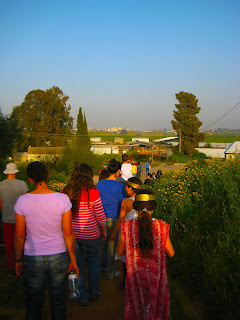On the kibbutz, families and children don't just do the average, they go all out with their celebrations. During the week leading up to Passover, there is a tumble and a buzz flying through every Jewish home as everyone cleans out the cubbards and sweeps each corner to prepare for the holiday. And the kids partake in projects, sing songs, and share all they know. Each community has their own unique brand of festivities and everywhere, children learn about their history. I had the pleasure this year to partake in a time-honored tradition on my family's kibbutz that was begun by my cousin's grandmother, Hava (who is now 100 years old, still making ceramic statues, walking on her own, and going strong), where they reenact the Passover story to the tune of fun activities, dances, small nuggets of a narrated play, and all-around good fun.
Take a look and follow along with the story with me:

First we greet Moses, from Mount Nebo, where his story ended, overlooking the holy land of milk and honey. He waits with his loudspeaker from the top of the ancient stoop to tell his story.
It begins with the dance of Pharoah's daughters by the Nile...
 |
| The steps of the community dining hall morph into the Nile |
 |
| Moses floating on the fish pond |
We continue our story with the discovery of the baby Moses when his mother sent him down the Nile in hope of his rescue. Little did she know he would be found by a Princess.
The adopted son of Pharaoh witnesses many hardships that the slaves must endure. He gets so angry when he sees a taskmaster mistreating a Hebrew slave that he attacks and murders him. He must run away to the desert.
 |
| The central hill of the kibbutz is transformed into the brick and mortar reality of the Hebrews |

After 40 years of peace and quiet in the desert, Moses sees a miraculous sight. A bush he has passed by hundreds of times is suddenly burning with fire! God tells him he has been chosen to tell Pharaoh to let his people go.
We go with Moses to the cow ranch, "Pharaoh's kingdom," to tell him to free the slaves. There are many plagues that the Egyptians face when Pharaoh's heart is hardened, including hail, coming from water guns. Quick! Run through!
 Pharaoh finally lets the Israelites go. They escape through the desert carrying bread to bake on their backs. They run through the miracle of the parted Sea of Reeds (and escape the stream of a huge hose!)
Pharaoh finally lets the Israelites go. They escape through the desert carrying bread to bake on their backs. They run through the miracle of the parted Sea of Reeds (and escape the stream of a huge hose!) 
 The Hebrews wander through the desert for 40 years. They ask for water and Moses gets angry and hits a rock instead of asking it for water. It finally comes in the form of Tropicana foil-wrapped juices. The people continue to bicker and complain. They need food. The miracle of mana falls from the sky, in the form of the popular Israeli treat bamba, straight from a crane that towers in front of the kibbutz dining hall and theater. Wow, God is really easy to spot in this version!
The Hebrews wander through the desert for 40 years. They ask for water and Moses gets angry and hits a rock instead of asking it for water. It finally comes in the form of Tropicana foil-wrapped juices. The people continue to bicker and complain. They need food. The miracle of mana falls from the sky, in the form of the popular Israeli treat bamba, straight from a crane that towers in front of the kibbutz dining hall and theater. Wow, God is really easy to spot in this version!And then comes the miracle of the ten commandments. The children of Israel dance for joy!

 |
| My two cousins are in the flowered light blue turquoise and black |
 |
| Dance performed by the children of the kibbutz |
 |
| Me pointing to my Savta (grandmother) singing in the first kibbutz choir |
 |
| A close-up of my Savta, age 24 |
 |
| In the 80's the tradition continued with my cousin, in pink, and my uncle in white on the far right |
And we shall teach our children so that we may never forget that we were once slaves in Egypt and then freed...
 |
| My amazing cousin Noam, age 9 |
 |
| Celebrating pesach through the years... |
 |
| My sweetheart cousin Amit, age 6, in blue |
Whereas in America we work so hard to infuse our children's experience with bubbles of Jewish learning and knowledge, here in Israel the history of the Jewish people is part of the normal cycle of events. Mana comes in the form of marshmallows and bamba. Moses in a curly grey beard standing on a hill in a garden. Everyone knows the words to every Passover song. "Simcha raba, simcha raba, aviv heegeya, Pesach ba..." Reenacting the hardships of slavery with the pulling of a farm cart. And the smiling, dancing children. We are so blessed to have this land that is so much more than milk and honey. It is the land of hope.
Happy Pesach to all!

No comments:
Post a Comment